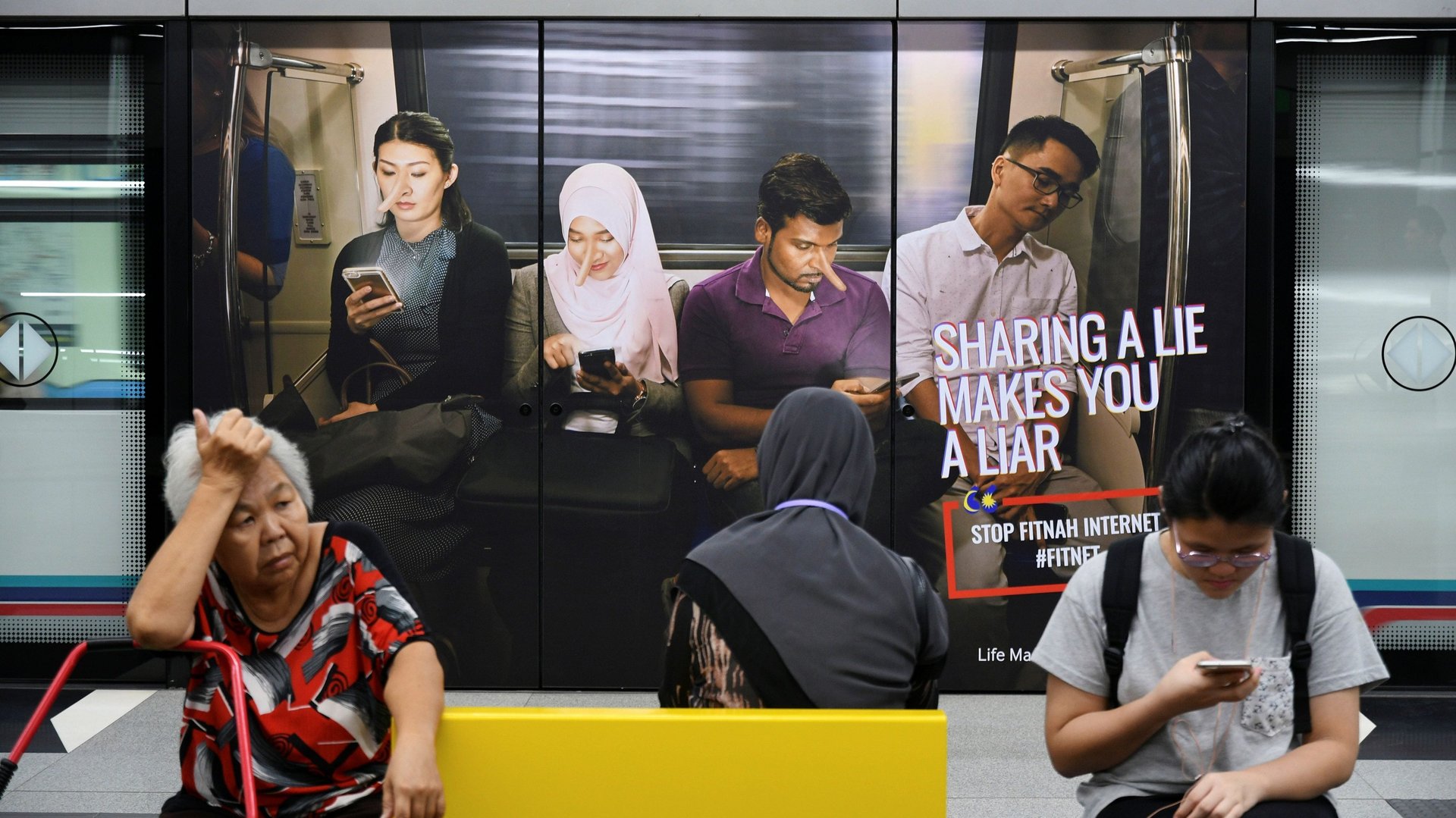Malaysia’s fake-news law is going to make it hard to talk about its biggest corruption scandal
A month ahead of a general election, Malaysia’s new fake-news law has gone into effect—and journalists and rights groups are worried it’s going to make it very hard to talk about corruption.


A month ahead of a general election, Malaysia’s new fake-news law has gone into effect—and journalists and rights groups are worried it’s going to make it very hard to talk about corruption.
The act, passed by Malaysia’s parliament earlier this month, received royal assent on April 9 and was published to a federal register yesterday (April 11) (pdf). The law makes publishing fake news punishable by a fine of more than $100,000 and up to six years in jail. It covers reports published in Malaysia or by foreign nationals overseas, as long as they relate to news about Malaysia or a Malaysian citizen, and defines fake news broadly:
“fake news” includes any news, information, data and reports which is or are wholly or partly false, whether in the form of features, visuals, or audio recordings or in any other form capable of suggesting words or ideas
The issue of fake news has gained prominence globally due to revelations that US voters in the 2016 presidential election may have been swayed by disinformation emanating from Russia—and due to president Donald Trump’s frequent lambasting of criticism in the media as “fake news,” a trope shared by many leaders in Asia. Malaysian prime minister Najib Razak said the country passed its fake-news law to prevent false information against the government, and to protect upcoming elections slated for May 9.
But many fear the main aim of the law is to prevent renewed scrutiny of Najib (paywall), who is running for re-election, in relation to state investment fund 1Malaysia Development Bhd (1MDB). At least $4.5 billion has been siphoned away from the fund since it was set up under the finance ministry in 2009, according to official investigations in countries including the US, Singapore, and Switzerland, and detailed in a longrunning investigation by the Wall Street Journal. Najib, who is also Malaysia’s finance minister, set up the fund and chaired the fund’s board of advisors until 2016.
The prime minister and 1MDB have denied wrongdoing—and Malaysia’s attorney general’s office in 2016 cleared Najib of any financial offence. That means the government could go after news reports associating Najib with the 1MDB embezzlement scandal as a form of fake news.
“A clear target of the legislation is discussion in Malaysia and abroad of the corruption scandal involving Prime Minister Najib Razak and the country’s 1MDB fund. Najib has been accused of embezzling hundreds of millions of dollars from 1Malaysia Development Berhad (1MDB),” said US-based rights group Human Rights Watch in a statement at the time of the tabling of the bill.
Some of the examples in the law of acts that would qualify as spreading fake news seem oddly specific (paywall). For example:
A gives a speech during a public forum at a public place. In his speech A informs that Z has misappropriated moneys collected for charitable purposes knowing that the information is false. A is guilty of an offense under this section.
Whether a particular information is “known to be false” could depend on whether the government has deemed it so. For example, Malaysia’s deputy communications minister has said that news on 1MDB that has not been verified by the government would be considered fake news.
Malaysia is not the only government in Asia trying to combat fake news, though countries in the region already count on a variety of legal means to quell speech, from libel and defamation statutes, to laws against sharing official secrets. Still, the Philippines last year amended libel laws to increase the punishment for publishing false news. Singapore in January set up a select committee to hold hearings on “deliberate online falsehoods,” after its law minister last year cited concerns over the possible spread of dissension in its multicultural community as one reason to consider regulation.